Richard Sorge was a bad man who became a great spy – indeed one of the greatest spies who ever lived. The espionage network that he built in pre-war Tokyo put him at just one degree of separation from the highest echelons of power in Germany, Japan and the Soviet Union.
Sorge’s best friend, employer and unwitting informant Eugen Ott, German ambassador to Japan, spoke regularly to Hitler. Sorge’s top Japanese agent Hotsumi Ozaki was a member of the cabinet’s inner advisory council and regularly talked to Prime Minister Prince Konoe. And in Moscow, Sorge’s immediate bosses were constant visitors to Stalin’s Kremlin study.
Sorge survived as an undetected Soviet spymaster for nearly nine years in Tokyo, even as Japan was swept by hysterical spy mania and the police constantly hunted for the source of his regular, coded radio transmissions. And yet he managed to steal the most closely kept military and political secrets of both Germany and Japan while hiding in plain sight. Sorge was both an idealistic communist and a cynical liar. He saw himself as a soldier of the revolution, a member of an exalted class of secret party cadres entrusted with the sacred task of penetrating the citadels of the USSR’s imperialist enemies.
But at the same time he was a pedant, a drunk, and a womaniser. He was addicted to risk, a braggart, often wildly indisciplined. On his frequent alcoholic binges, he crashed cars and motorcycles, drunkenly confessed his love for Stalin and the Soviet Union to audiences of Nazis, and recklessly seduced the wives of his most valuable agents and closest colleagues. Sorge often spoke of himself as a romantic hero, a robber-knight from German Romantic poetry.
In truth he was one of the lonely deciders who haunt the fringes of the political desert, a man always destined to carry the burden of superior knowledge and higher motives than the lesser humans who surrounded him. A self-professed champion of the working masses, he was a raging intellectual snob whose natural milieu was the casinos, whorehouses and dance halls of pre-war Shanghai and Tokyo.
Professional dissembler
Above all he was a professional dissembler. Like most who reached greatness in his profession, Sorge was driven by a profound compulsion to deceive. Deception was both Sorge’s skill and his fatal addiction. For most of his life Sorge lied to all those around him – his many lovers and friends, his colleagues and his masters. Perhaps he even lied to himself. One of the most extraordinary things about the Sorge story is the realisation that he moved in a world of shifting international alliances and infinite possibility.
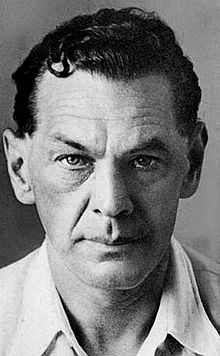
To the nationstate players at the time, even the most cast-iron certainties of hindsight were still malleable – even such apparently immutable matters as which nation would be on which side in the Second World War. For much of Richard Sorge’s career, the Soviet Union and Germany, while ideological opponents, were in fact covert allies. Throughout the 1920s the German Army sent thousands of troops for training on the plains of Belorussia, under the terms of a secret agreement between Moscow and Berlin.
Doublecrossing Hitler
In 1939 Stalin struck a deal with Hitler to divide up Europe, from the Baltics to the Balkans via Poland. Soviet and Nazi troops, victorious against their common Polish enemy, staged joint victory parades in Brest and other occupied cities. As late as February 1941, Hitler was offering Stalin membership of the Axis powers – albeit while simultaneously preparing to invade the USSR – and urging that Germany, Italy, Japan and the Soviet Union divide the world between the great dictatorships of the age.
Stalin, while wary, was certainly tempted. Until the night of 22 June 1941, Hitler and Stalin were allies and the latter apparently believed that he would remain so. Even more strangely, we now know – as Richard Sorge did not – that from September 1940 Stalin had also laid his own contingency plans for invading Germany, known as Operation Groza. Even as he sent Germany vast supplies of corn, oil and steel to fuel the Nazi war effort under the terms of the 1939 non-aggression pact with Berlin, the Soviet dictator had his own opportunistic scheme in place for doublecrossing Hitler should the opportunity arise.
Japan
Japan’s role in the world war was even more mutable. It was clear from the moment that a group of renegade Japanese officers provoked an invasion of Chinese Manchuria in 1931 that Tokyo’s military had expansionist dreams in Asia – ambitions that would, in time, swamp the protests of the civilian government at home. But Japan’s attitude to Russia was deeply ambiguous. The Japanese Army lobbied forcefully for an invasion of the Soviet Union – an invasion which would have utterly destroyed Stalin’s efforts to fight the Germans after the Nazi invasion of Russia in 1941. The Japanese Navy was equally adamant that the nation’s imperial destiny lay to the south, in seizing control of the rice fields of Indochina and the oil wells of the Dutch East Indies.
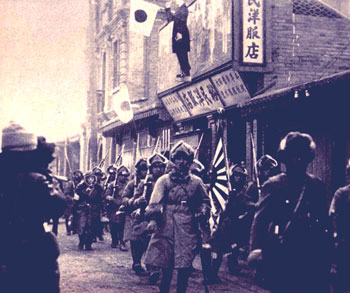
Thus the survival of the USSR hung on the intricate power plays inside the Imperial Japanese General Staff in 1941. Could Stalin afford to denude the Soviet Far East of troops in order to defend Moscow? It depended on knowing whether or not Japan’s 1941 invasion plan for the USSR was going to be put into action. And it was their master agent, Sorge, who could tell them.
Alliances to be made and broken
Nor was Japan’s collision course with America by any means certain, even as late as October 1941, just weeks before the Japanese Navy’s surprise attack on Pearl Harbor. On the contrary, Prime Minister Konoye had spent years desperately trying to forge a deal with Washington to avoid war in the Pacific. His envoy, Admiral Nomura, Japan’s ambassador in the United States, came tantalisingly close to negotiating a nonaggression pact with US president Franklin Roosevelt in the summer of 1941.
Richard Sorge’s world was one where alliances even between such natural enemies as Hitler and Stalin, Stalin and the Japanese militarists, were made and broken. Unlike most spies of the twentieth century, Sorge’s espionage was not merely a matter of betrayed agents and blown secret operations; it had a terrifyingly direct bearing on the fate of nations and the course of the entire war.
Among the stranger aspects of the Richard Sorge story is that unlike many other tales from the shadow world of espionage, it is extraordinarily well documented. After their arrest by the Japanese authorities in October 1941, every member of the Sorge spy ring – with the honourable exception of Kawai, one of Richard Sorge’s junior agents – sang like canaries. All confessed because of a basic desire to survive. But the various members of the group all had different motivations for their cooperation.
Double agent
Richard Sorge himself had been misunderstood and unappreciated for years by his Moscow masters, and wrote a long prison confession that boasted about his own espionage prowess, his professionalism and integrity. We know, but Richard Sorge did not, that he was also frankly distrusted by his controllers in Moscow who thought he could be a double agent.
Richard Sorge hoped, until the very end, that the Soviet Union would save him; therefore Sorge confessed nothing of his doubts about communism, his plans for flight, his secret bank account in Shanghai – these we now know about from other sources. The spy ring’s long-serving radio man, Max Clausen, had the opposite message for the Japanese.
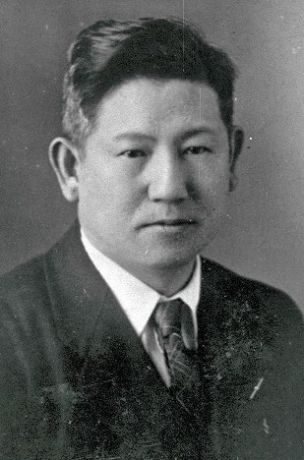
He freely admitted to losing his communist faith and even boasted about systematically sabotaging his boss’s espionage efforts by regularly ripping up or severely truncating the cables that Sorge had given him to send. Clausen evidently hoped for mercy from his captors, which he received. Richard Sorge’s star agent, Hotsumi Ozaki, an idealistic young journalist who later rose to the position of trusted adviser to the Japanese cabinet, was keen to prove that his apparent treachery was a species of patriotism.
Japanese secret police
Ozaki told his captors that he had been working for the cause of international peace and had his nation’s best interests at heart, as he strove to avoid a war between Japan and Russia. Whatever their various reasons, the prisoners gave their Japanese interrogators a gigantic trove of detailed information on their lives and espionage careers stretching back as far as the early 1920s.
More, the Japanese secret police had been intercepting and transcribing the ring’s encoded radio messages from almost the first moment that Clausen had begun transmitting the secret reports from Tokyo to Moscow. Despite strenuous efforts, the Japanese had never been able to locate the transmitter, nor decipher the messages. But once Clausen surrendered the book code that he had used to encrypt his telegrams, Japanese military intelligence was able to read almost every word of Richard Sorge’s secret correspondence with his masters in Moscow.
The confessions and the transcripts, which fill two thick volumes of testimony, were published in full after the war. This evidence was later cited at length by McCarthy-era anti-communists in the United States as a lurid blueprint of how Soviet intelligence could penetrate the highest levels of a government.
Where’s the Soviet side of the story?
Two things are missing in the vast trove of confessions and decrypts gathered by the Japanese police, as well as from the hundred-odd books that have been written about Richard Sorge, mostly by Japanese historians, since his execution in Sugamo prison in Tokyo in November 1944.
The most important omission is the Soviet side of the story. No Western historian has accessed the Richard Sorge files in the archives of the Communist International in Moscow or the Soviet military intelligence archives in Podolsk – or cited the important recent work by Russian historians based on parts of the military archive that have been closed to foreign researchers since 2000.
The story of Richard Sorge’s turbulent career as an agent for the Communist International, his apparent disgrace as that organisation was ruthlessly purged of all but the most slavishly loyal non-Russians under Stalin, of Richard Sorge’s recruitment by Soviet military intelligence and the subsequent cycles of distrust and paranoia that led to Sorge’s gold-standard intelligence being dismissed as enemy disinformation, is told in AN IMPECCABLE SPY for the first time.
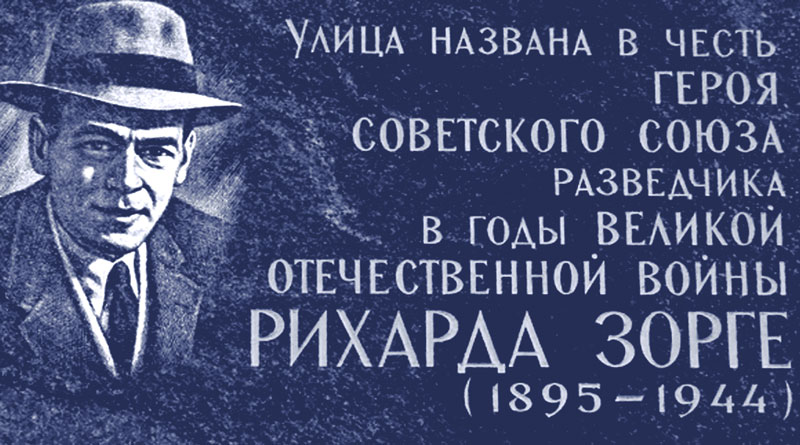
So is the inside story of Richard Sorge’s desperate attempts to warn Stalin of the coming German invasion of the Soviet Union in July 1941 – a warning that was systematically suppressed by the top brass of the Red Army, terrified of contradicting Stalin’s fixed idea that Hitler would never attack him. The other missing piece from the Japanese version of events is any sense of Sorge’s inner life: his doubts and fears. As John le Carré observed, spies make for tremendously unreliable narrators because they have so often invented and reinvented themselves.
Richard Sorge’s pawns
For most of his adult life Richard Sorge lived in a world where the risk of arrest and betrayal followed him like a shadow. During his years in Japan he had nobody but his immediate subordinates with whom he could share his secrets. Even his closest Japanese agents, Ozaki and Miyagi, never became personal friends. Richard Sorge was, like many spies, an indefatigable ladies’ man. The talents of spy and serial seducer are deeply intertwined. American intelligence estimated that he had affairs with at least thirty women over the course of his residence in Tokyo. But even Sorge’s lovers were, to a greater or lesser extent, pawns that he deployed in his spy games.
He thrilled and terrified them with wild motorcycle rides through the night. To a few, he revealed a megalomaniacal side as he danced about his house, waving a samurai sword and ranting drunkenly about how he was going to slay Hitler and become a god.
Even in his most private moments, he was play-acting at being someone greater than himself. He frequently complained to his lovers of his loneliness, but allowed none of them to share the burden of the secrets he carried within himself. All the same, the testimonies of the women in Richard Sorge’s life give us a valuable side view of the man he wanted to be.
A shadow world
And the Soviet archives reveal many more insights into his private world in the form of his letters to his Russian wife, and in the memoirs and correspondence of his Moscow friends and colleagues, cited in Matthews book “An Impeccable Spy” in English for the first time. Richard Sorge presents an unusual challenge for a biographer. He lived most of his life in a shadow world where his life depended on secrecy.

Yet he was also an extrovert and, in many ways, an exhibitionist. Once the game was up, in the loneliness of a Japanese prison, Sorge busied himself with spinning an idealised version of himself for his interrogators, and perhaps for posterity. In his extensive correspondence with Moscow, his letters to his wife, Katya, his journalism and scholarship and his confessions, he left a vast written record.
However, like many apparently gregarious people, he kept his inner self a closely guarded secret. He was a man with three faces. One face was of Sorge the social lion, the outrageously indiscreet life of the party, adored by women and friends. His second, secret, face was turned to his masters in Moscow.
And the third, the private man of high principles and base appetites living in a world of lies, he kept almost entirely to himself. Richard Sorge had a talent for situations, which served him well throughout his erratic and changeable life. The ease with which he was able to move from one milieu to another, from one place, woman, friend, to another, was staggering. Men and women alike found his self-destructive charisma irresistible.
Paradox
He could be savagely elemental, temperamental, capricious, often as selfish as a child. His story reminds one of a man constantly trying out a series of savage caricatures of himself on the world, adopting slightly new variants of his social persona. And as with many lonely people, he had a burning desire to be loved, and to be fabulous, but loved from afar. And that was his paradox; the more fabulous and successful he became, the more impossible it became for him to be loved for himself. He was a man of many friends, but could confide in almost none of them.
He spent most evenings out carousing at parties, bars and restaurants – yet he lied to and used almost every one of his wide circle of acquaintances. Indeed, it was his magic facility for putting people at their ease that was his greatest life skill. Richard Sorge’s charm also kept him alive.
Butcher of Warsaw
When the brutal Gestapo Colonel Joseph Meisinger, nicknamed the ‘Butcher of Warsaw’, was sent to Tokyo to investigate him, Sorge took him out carousing in the fleshpots of Ginza and quickly made a bottle-mate of his deadliest enemy. Richard Sorge was also brave. Whether it was snatching photographs of secret documents when left alone for a few minutes in the German ambassador’s study, or lying terribly injured in hospital after a drunken motorcycle wreck, but fighting to hold on to consciousness until a friend could arrive to recover incriminating documents from his jacket pocket, Sorge maintained an almost supernatural cool.
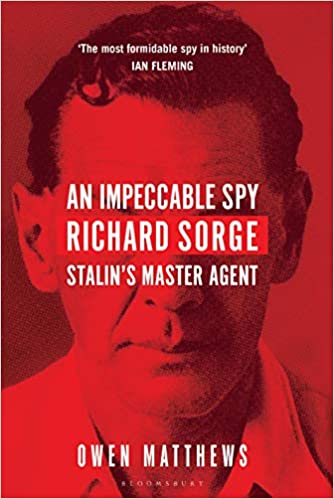
https://amzn.to/2XQ6XZC
He always thought of himself as a soldier, from his teenage years in the service of the Kaiser in the trenches of the First World War to his last moments on the gallows, when he stood to attention and saluted the Red Army and the Soviet Communist Party. For all his drunken indiscretions, he always lived a life of furious activity, rising early and spending hours every day writing, reading and spying.
He was an officer and a professional, even when drunk, even in despair. And in some ways he was also a gentleman. In prison he refused to discuss the women in his life and never mentioned his long-standing Japanese mistress to his interrogators. The prosecutor who questioned him described Richard Sorge as ‘the greatest man I have ever met’. Sorge was also an intellectual of sorts.
Richard Sorge certainly had at least a robust and competent intelligence. He wrote in his prison memoir that in peaceful times he would have been a scholar. He lived his life as the principal actor in a one-man show whose real audience was unknown to its physical spectators – his nearly always remote spymasters in the Fourth Directorate of the Red Army’s General Staff. It was Richard Sorge’s tragedy that for the most crucial part of his career they doubted his loyalty and thought him a traitor – though he himself mercifully never knew that the brilliant intelligence that he supplied was often scorned and discounted.
src. Owen Matthews good read: An Impeccable Spy: Richard Sorge, Stalin’s Master Agent
Another master spy of the Soviets: Kim Philby https://www.maier-files.com/kim-philby-a-spy-among-friends/



